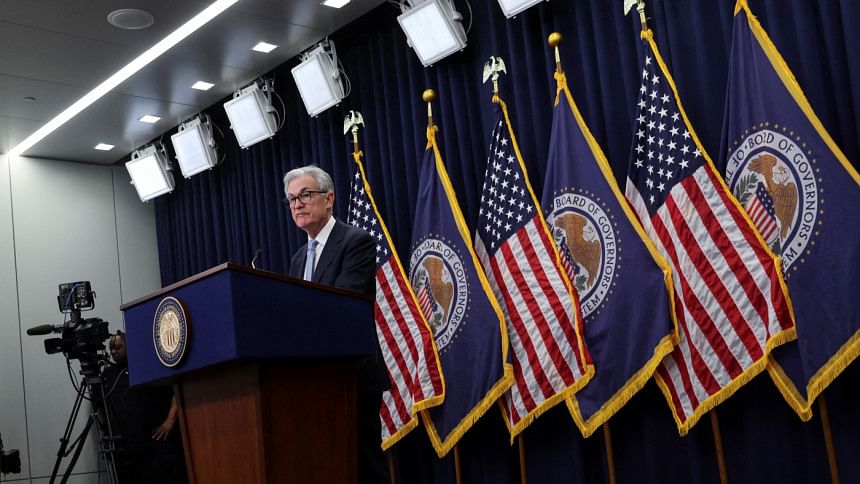US Federal Reserve raises interest rates amid global banking turmoil

The Federal Reserve on Wednesday raised interest rates by a quarter of a percentage point, but indicated it was on the verge of pausing further increases in borrowing costs amid recent turmoil in financial markets spurred by the collapse of two US banks.
The move set the US central bank's benchmark overnight interest rate in the 4.75%-5.00% range.
But in a key shift driven by the sudden failures this month of Silicon Valley Bank (SVB) and Signature Bank, the Fed's latest policy statement no longer says that "ongoing increases" in rates will likely be appropriate.
The three major US stock indexes, which were mostly languid prior to the Fed announcement, moved higher in the immediate aftermath as investors digested the hike and the accompanying statement.
Traders had been split over whether the US central bank would be forced to pause its hiking cycle as authorities in the United States urgently explore ways to bolster financial stability, along with tackling the problems facing First Republic Bank.
Though the Federal Open Market Committee policy statement said the US banking system is "sound and resilient," it also noted that recent stress in the banking sector is "likely to result in tighter credit conditions for households and businesses and to weigh on economic activity, hiring, and inflation."
The Fed's relentless rate hikes to rein in inflation are among factors blamed for the biggest banking sector meltdown since the 2008 financial crisis.
The latest move to restore calm to restive regional bank stocks came as Pacific Western Bank, one of the regional lenders caught up in the market volatility, said it had raised $1.4 billion from investment firm Atlas SP Partners.
Shares of the bank, which have lost nearly 47% of their value so far this year, were down more than 10% in afternoon trading even as it tried to assuage investor worries by saying it had more than $11.4 billion in cash as of March 20.
But less than two weeks after Silicon Valley Bank sank under the weight of bond-related losses due to surging interest rates, the CEO of hedge fund Man Group, Luke Ellis, said the turmoil was not over and predicted further bank failures.
Policymakers from Washington to Tokyo have stressed the turmoil is different from the crisis 15 years ago, saying banks are better capitalised and funds more easily available.
SVB's collapse kicked off a tumultuous 10 days for banks which led to the 3 billion Swiss franc ($3.2 billion) weekend takeover of Credit Suisse by rival UBS.
While that deal brought some respite to battered banking stocks, First Republic remains firmly in the spotlight. The US lender is looking at ways to shrink if it cannot raise new capital, three people familiar with the matter said.
First Republic's shares pared losses to trade down 2.3% on Wednesday afternoon.
Scenarios for the bank were being discussed as major bank CEOs gathered in Washington for a scheduled two-day meeting starting on Tuesday, sources familiar with the matter said.
Although the Fed has said its review of SVB's supervision will be finished by May 1, banking system ructions were likely to feature prominently in its post-meeting news briefing.
In further fallout, a conservative Republican and a progressive Democrat in the US Senate are introducing legislation to replace the Fed's internal watchdog with one appointed by the president, aiming to tighten bank supervision following the failures of SVB and Signature Bank.
Republican Rick Scott and Democrat Elizabeth Warren blamed the collapse of the two banks on regulatory failures at the US central bank, which has operated up to now with an internal inspector general who reports to the Fed board.
The Fed was not immediately available for comment.
A NON-EVENT?
Across the Atlantic, European Central Bank top brass said they will watch for signs of stress in bank lending, a day after the ECB warned banks not to be caught off-guard by rising rates.
As investors wonder whether the ECB will be able to continue its own rate hikes to fight inflation, its chief economist Philip Lane said market jitters may turn out to be "a non-event" for monetary policy, while a full-blown crisis that completely rewrites the outlook is unlikely.
For now, the rescue of Credit Suisse appears to have calmed the worst fears of systemic contagion, boosting shares of European banks and US lenders.
Speaking before Lane, ECB President Christine Lagarde said the ECB's rate hikes could be magnified if banks become more risk-averse and start demanding higher rates when lending - implying the central bank may need to do less.
Nevertheless, an unexpected jump in UK inflation last month led investors to bet heavily that the Bank of England will raise interest rates by at least another 25 bps on Thursday.
WIPEOUT
The wipeout of Credit Suisse's Additional Tier-1 (AT1) bondholders has sent shock waves through bank debt markets.
But one of the largest investors in the Credit Suisse bonds said he still believes in the value of contingent convertible debt, known as CoCos, and the "bail-in" system meant to save banks seen as too big to fail.
Seeking to boost confidence among investors rattled by its $3 billion Credit Suisse rescue, UBS said on Wednesday it would buy back 2.75 billion euros ($2.96 billion) worth of debt it issued less than week ago.
"They're trying to be friendly to investors who purchased just before the mess," said Jerome Legras, head of research at Axiom Alternative Investments.

 For all latest news, follow The Daily Star's Google News channel.
For all latest news, follow The Daily Star's Google News channel. 



Comments